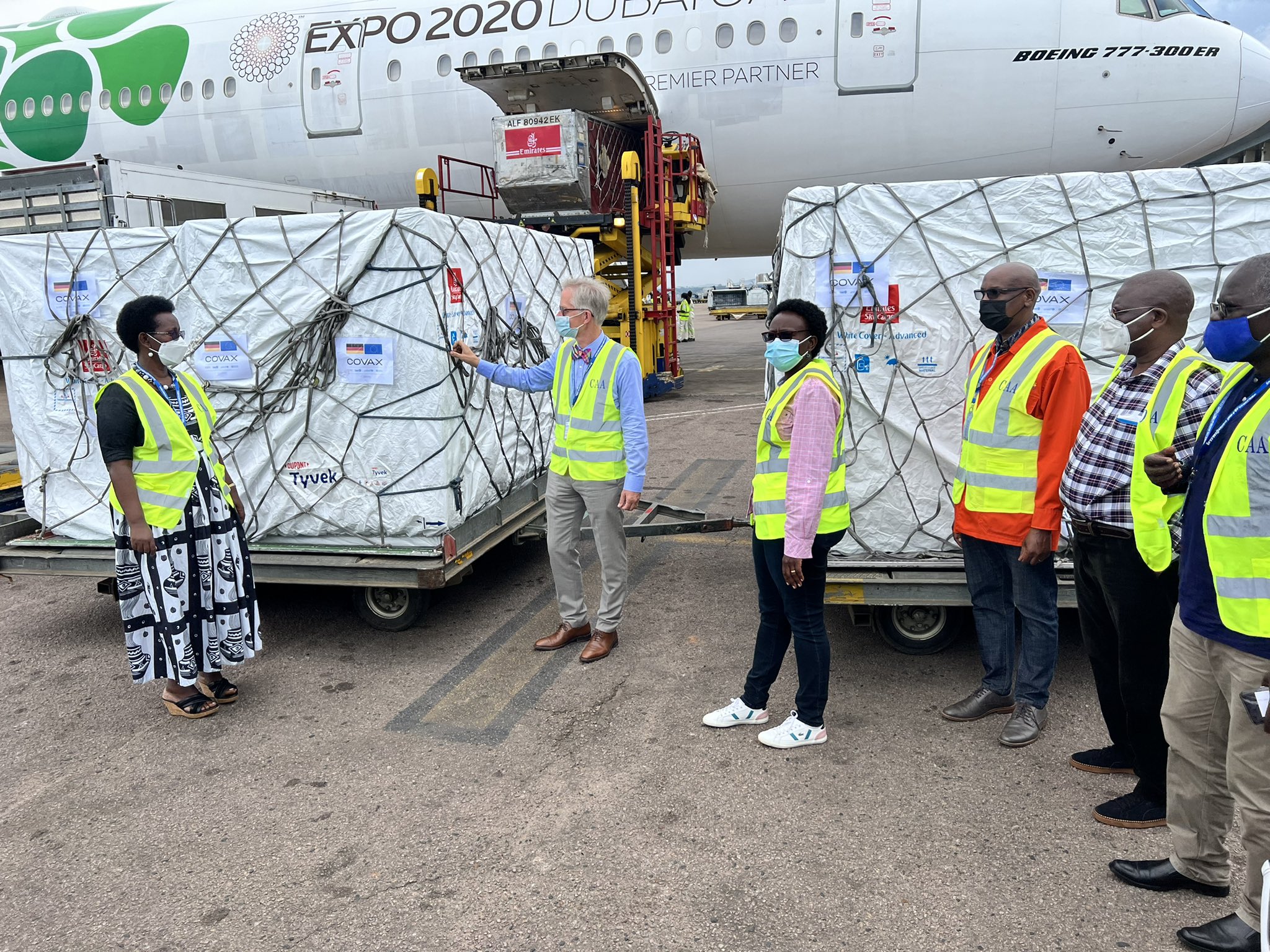Over 40m Covid vaccines in East Africa’s govt stores at risk of expiry due to apathy, logistics
Tuesday December 28 2021

A consignment of of J&J vaccines from the Germany government received by the Health Ministry's permanent Secretary, Dr Diana Atwiine (Courtesy photo)
More than 40 million doses of Covid-19 vaccines in East Africa’s government stores are nearing expiry, as apathy and logistical challenges slow down their administration.
In the face of an accelerated spread of the Omicron variant in recent weeks, data compiled by The EastAfrican from the regional governments’ health ministries shows that out of 74 million vaccines that the region has received in donations and purchases, the region has administered just 30.1 million doses.
Rwanda leads the EAC in dispensing the vaccines, administering over 11.4 million doses, or 83.8 percent of the 13.6 million it has received.
Tanzania has given out about half of its vaccines — 2.04 million out of the 4.4 million received. Kenya is third, having administered nine million doses out of the 23.2 million it has received. Uganda has the highest number of vaccines sitting in its stores, having administered 8.9 million doses of the 32.09 million received.
Sub-Saharan Africa has administered 153 million doses of the 317 million received, according to the African Union’s Partnership for Evidence-based Response to Covid-19 research.
Given the short lifespan of many of the donations from the West, governments are finding it difficult to dispense them within required timelines.
At the end of November, the African Vaccine Acquisition Trust (Avat), the Africa Centres for Disease Control and Prevention (Africa CDC) and Covax noted that the majority of the donations have been ad hoc.
“This has made it extremely challenging for countries to plan vaccination campaigns and increase absorptive capacity. To achieve higher coverage rates across the continent, and for donations to be a sustainable source of supply that can complement supply from Avat and Covax purchase agreements, this trend must change,” they said in a joint statement.
“Countries need predictable and reliable supply. Having to plan at short notice and ensure uptake of doses with short shelf lives exponentially magnifies the logistical burden on health systems that are already stretched. Furthermore, ad hoc supply of this kind utilises capacity — human resources, infrastructure, cold chain — that could be directed towards long-term successful and sustainable rollout. ”
Destruction
Nigeria has had to destroy more than a million expired doses of AstraZeneca vaccines, soon after Senegal announced that at least 400,000 of its vaccines had expired as a result of low uptake. Speaking to the BBC, Nigeria’s Health Minister Osagie Ehanire explained the decision to discard vaccines that were donated as they were nearing their expiry dates.
“That left us a very short time — some just weeks — to use them, after deduction of time to transport, clear, distribute, and deliver to users,” said Mr Ehanire.
For Africa, and the EAC, unpredictable deliveries of vaccines, often near the expiry dates, has left governments conducting roadshows and using media to publicise vaccination drives.
“Despite recent investments in expanded cold-chain in preparation for Covid-19 vaccines, the health system cannot always meet the storage needs for a sudden surge in supply, particularly for those vaccines requiring ultra-cold storage.
Surges cause a similar issue for vaccine transport vehicles, replacement cold packs, and vaccine carriers, all in short supply,” health experts under the Covid Global Accountability Platform said on Thursday.
The group called on donor countries to co-ordinate with recipient governments to support effective planning.
The number of African countries that have made Covid-19 shots mandatory continues to increase following the example of Nigeria, Ghana, Egypt, South Africa, Rwanda and Zimbabwe.
In East Africa, Kenya and Uganda seek to join Kigali in enforcing vaccine mandates to increase the number of citizens vaccinated.
This is despite logistical bottlenecks in getting the vaccines out of the central stores into the countryside made worse by the ongoing rains that have rendered infrastructure in remote parts unusable.
“Vaccines arriving at airports is just the beginning of a journey that has many obstacles — from a lack of refrigeration, syringes and health workers, to competing priorities — that can impede the path to vaccination,” said Ahmed Ogwell Ouma, deputy director of the Africa CDC.
Africa CDC has advised countries to resort to vaccine mandates if “citizens don’t hurry to get the available doses”.
Mandates aim to increase vaccine uptake, protect health and health systems, allow the economy to stay open, and encourage tourists to visit because the countries will be perceived as safe.
Rwanda requires proof of vaccination to access high-risk public spaces, where harm to others could occur, such as restaurants, bars, public transport, churches, meetings and weddings.
“The vaccine mandate is just a way of inviting people to get vaccinated because the vaccines are available, and the government has invested in making them available.
It is their right, but also an obligation to protect themselves and everyone around them,” said Rwanda’s Minister of Health Dr Daniel Ngamije.


